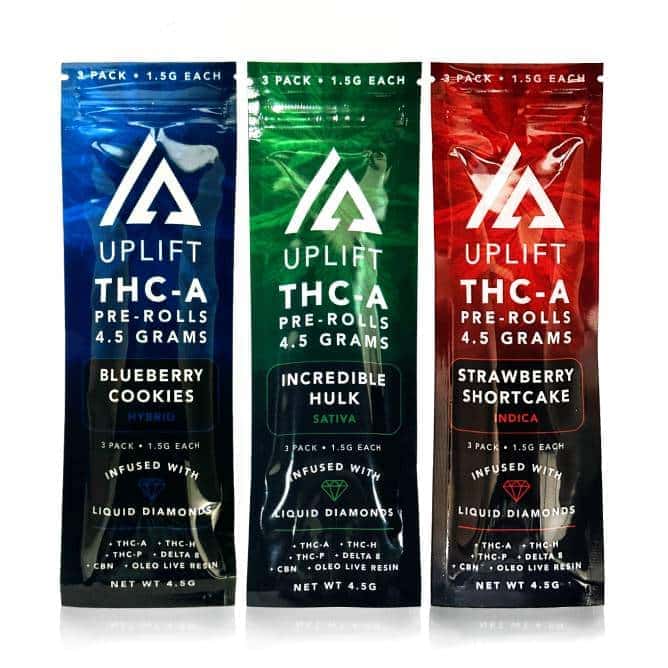In recent years, the popularity of CBD in Florida has been growing rapidly for a variety of reasons. For relaxation, stress relief, pain management, and sleep support—all without THC’s intoxicating effects. So whether you are familiar with using CBD or you are just beginning your journey into it, you must find a good source of the best CBD in Florida so you are assured of the best experience.
At Uplift CBD, we believe in offering only quality products, lab tested for peace of mind, made from non-GMO, U.S.-grown hemp. From tinctures, pre-rolls, vapes, and topicals to pet-friendly CBD, we have you covered! It has never been easier to get CBD in Florida.
We strive to ensure fast, reliable nationwide shipping, bringing reliable and high-quality CBD products to your doorstep in the state.
Is CBD Legal in Florida?
Yes! CBD derived from hemp and containing less than 0.3% THC is legal in Florida. This is consistent with federal rules under the 2018 Farm Bill, which legalized hemp-derived CBD across the United States. In Florida, CBD has been embraced for wellness, available online and in establishments.
But not all CBD products are made the same. At Uplift CBD, all of our products are lab-tested for potency and purity, allowing you to know exactly what you’re consuming.
✅ 100% Legal Under Federal and Florida Law ✅ Non-Intoxicating (Less Than 0.3% THC) ✅ Lab-Tested for Purity & Potency
Shop Premium CBD in Florida – Our Best-Selling Products
We have Florida CBD products to suit every lifestyle and health goal. So, if you’re looking for fast-acting relief, long-term benefits, or something pet-friendly, we have you covered.
1. 1.5g CBD Pre-Roll – $4.99
A smooth, ready-to-smoke CBD experience.
Serving Size: 1.5g Preroll
Strains Available:
Sativa: Strawberry Cough – Uplifting & Energizing
Hybrid: Ice Cream Cookies – Balanced Effects
Indica: Bubba Kush – Relaxing & Calming
Ingredients: Non-THC derived terpenes
2. 2g CBD Disposable Vape – $19.99
Convenient, discreet, and fast-acting CBD relief.
Serving Size: One puff (varies based on usage)
Flavors Available:
Sativa: Cantaloupe Haze, Strawberry Cough
Indica: Bubba Kush
Hybrid: Bomb Pop
Ingredients: CBD, non-THC derived Terpenes
3. Chew’em CBD Dog Chew – $12.99 – $15.99
Support your pet’s wellness with our tasty CBD chews.
Sizes Available:
Small: For dogs under 30 lbs
Large: For dogs 30-60 lbs
Flavors: Bacon, Beef, Chicken, Salmon
4. CBD Tincture Full Spectrum Sublingual
A versatile way to take CBD with long-lasting benefits.
Strength Options:
750mg: 25mg per 1ml dropper
1500mg: 50mg per 1ml dropper
3000mg: 100mg per 1ml dropper
Flavors: Unflavored, Citrus, Peppermint
Ingredients: Organic MCT oil (Coconut derived), Cannabidiol (CBD)
5. CBD Full Spectrum Topical
Targeted treatment with skin-soothing ingredients.
Ingredients: Coconut oil, Shea butter, Lavender essential oil, Tea tree oil, and Full Spectrum CBD
How to Choose the Right CBD Product?
With so many different CBD products in the market here in Florida, how do you select the best CBD product for you? Here’s a rapid-fire cheat sheet:
✔ For Stress & Relaxation: Use one of the CBD vapes or tinctures that work quickly. ✔ For Sleep Support: Choose a CBD tincture that contains melatonin. ✔ For Pain Relief: CBD topicals are great for sore, aching muscles. ✔ For Daily Wellness: You can take CBD capsules or tinctures consistently. ✔ For Pet Wellness: Our CBD dog chews are a safe, pet-friendly option.
Why Buy CBD in Florida from Uplift CBD?
There are many CBD stores in Florida, but Uplift CBD stands out for our commitment to quality, safety, and customer satisfaction.
✅ 100% Legal & Lab-Tested CBD – We follow all federal and state regulations. ✅ Non-GMO & U.S.-Grown Hemp – Quality ingredients from trusted farms. ✅ No More Than 0.3% THC – Compliant with Florida CBD laws. ✅ Fast & Reliable Shipping – Get CBD delivered anywhere in Florida. ✅ Wide Range of Products – From CBD pre-rolls to tinctures, vapes, and topicals.
Where to Buy CBD in Florida?
The easiest way to get CBD in Florida is to order online from Uplift CBD. Fast, free shipping, great prices, and lab-tested products you can trust. From Miami to Tampa, Orlando to Jacksonville, and everything in between, we ship the best CBD directly to you.
FAQs About CBD in Florida
1. How Much CBD Should I Take?
How much you should take also depends on your weight, metabolism, and what product you are using. Begin with a low dose and go up as necessary.
2. How Long Does CBD Take to Work?
CBD tinctures: 30-60 minutes
CBD vapes: Almost instantly
CBD edibles: 1-2 hours
CBD topicals: 10-30 minutes
3. Can I Use CBD With Other Medications?
It’s best to check with your doctor before taking CBD with other medications.
4. Will CBD Show Up on a Drug Test?
The majority of CBD products do not include any THC; however, full-spectrum CBD contains small levels. If you’re subject to drug testing, choose broad-spectrum or isolate CBD.
5. What’s the Best Way to Take CBD?
Depending on your preference, CBD can be taken through a variety of methods:
Sublingual (Under the Tongue): CBD tinctures for fast absorption.
Inhalation: CBD vapes for immediate effects.
Topical Application: CBD creams for targeted relief.
Edibles: CBD gummies for a tasty, long-lasting experience.
Shop the Best CBD in Florida Today!
In conclusion, if you're searching for high-quality CBD in Florida, Uplift CBD has it all. From CBD tinctures, gummies, and vapes to topicals, everything we offer is built to fit your wellness journey.
🛒 Shop Now & Get Fast Shipping Anywhere in Florida!
📞 Have Questions? Call Us at 727-498-8543





